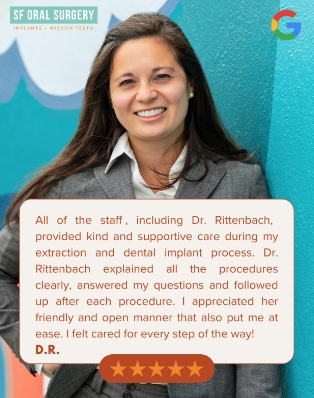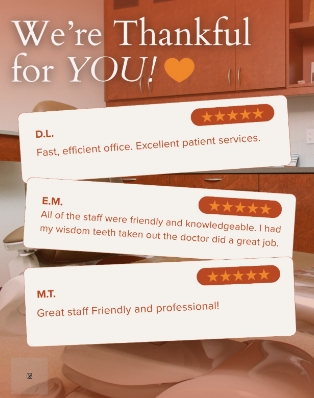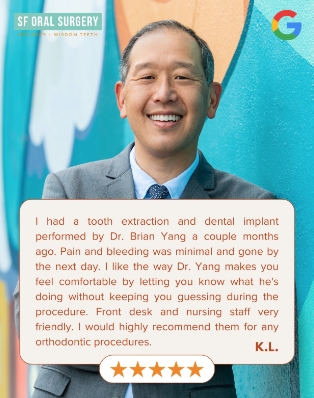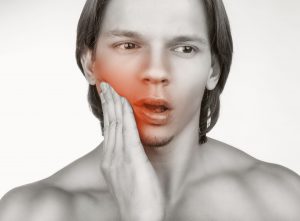
Wisdom teeth are the third set of molars at the back of your mouth and are the youngest of all your teeth. The rest of your teeth emerge when you are still young. For instance, your two front teeth or central incisors erupt when you are six or eight months old.
Wisdom teeth appear much later. Those teeth probably just started growing when you were between 17 and 25 years old. People at this age range are presumably wiser and have had enough experience to gain wisdom–which is why they are called wisdom teeth.
What Are Impacted Wisdom Teeth?
Your wisdom teeth become impacted when they do not have enough room to erupt or if they grow abnormally. People with shorter jawbones tend to have just enough room for the first two molars to grow comfortably, leaving the wisdom teeth with little to no space at all. Still, this does not stop the wisdom teeth from growing inside the gum.
Some wisdom teeth get stuck inside the gum, pushing or leaning against the second molar. In some cases, wisdom teeth grow toward the back of your mouth or even inward into the oral cavity. Their development depends on various factors, including how much room they have, the shape of the jawbone, and the strength of the adjacent teeth, among others.
Signs and Complications of Impacted Wisdom Teeth
While wisdom teeth usually emerge at the beginning of adulthood, you cannot tell exactly when that will happen. You only know you have wisdom teeth growing inside your gum when they are already impacted, and the pain has kicked in. Here are several indicators of impacted wisdom teeth:
- Excruciating Pain – As your wisdom teeth grow, pressure builds up within your gum. Your first and second molars experience the brunt as the wisdom teeth push them off their growth path. This creates a searing pain that goes from the back of your mouth to your front teeth.
- Decay – The eruption of your wisdom teeth may cause a gap to form between them and the second molars. This area is difficult to clean because you do not see it, and it is nestled deep in the gum. Over time, food may get stuck in this fissure and become home to bacteria.
- Crowding – Wisdom teeth typically have strong base support, allowing them to quickly push other teeth off their growth path. As a result, the nearby teeth grow at different angles.
- Gum Infection – Your teeth are not the only ones that decay because of bacterial infection. Your gum, which is softer and more vulnerable, gets infected, too. If neglected, the gum infection can develop into an even worse and often irreversible gum problem.
- Cyst – A fluid-filled sac that feels like a bump may form along with the eruption of your wisdom teeth. This fluid may harbor bacteria and trigger an infection that later turns into a cyst. If left untreated, it might develop into a tumor.
Impacted wisdom teeth can have a much worse effect if neglected for a long time. If they push the rest of the teeth too much, it will lead to a significant malocclusion that only orthodontic treatment can fix. But first, the wisdom teeth must be extracted along with the rest of the teeth it has severely damaged.
How Oral and Maxillofacial Surgeons Diagnose Impacted Teeth
Wisdom teeth are hard to probe with an explorer alone because it is embedded in the gums. Unless you cut the gum open, you will not see how the wisdom teeth are growing and how much damage they have caused.
Your oral and maxillofacial surgeon will ask you to take an x-ray of your mouth to check how the growth of your wisdom teeth is affecting the rest. Then, your oral surgeon will create a treatment plan based on the result. Your surgeon will be able to tell if there are other issues or irregularities in your oral cavity through the x-ray results as well.
Wisdom Tooth Extraction
Removing a wisdom tooth is different from a typical tooth extraction. Because wisdom teeth are often hidden within the gum and slightly tilted, they need surgical removal. In other words, wisdom tooth extraction is surgery and should be performed by a licensed oral and maxillofacial surgeon from a trusted practice.
However, the surgery is less invasive and does not require staying in the clinic for a day or two. It is an outpatient surgery, meaning you can go home on the same day. Regardless, it is essential to know how wisdom tooth extraction works so you can prepare for it and recuperate quickly.
Instructions Before Surgery
- Do not eat anything for at least eight hours before the surgery. Your stomach must be empty when the surgeon administers the anesthetic.
- Let your doctor know if you are taking routine prescribed or herbal medication during the consultation.
- Have someone accompany you to and from the hospital. It takes time for the effect of the anesthetic to wear off, so it is best if you have someone to drive you home after the surgery.
- Wear comfortable clothing and low-heeled shoes. This will allow you to be comfortable and stable if you are feeling nauseous.
- Stop smoking for five days before the surgery. Tobacco contains substances that are not helpful to recovery.
Anesthetic
Like in any other surgery, your oral and maxillofacial surgeon will determine what type of anesthetic to administer based on your vitals, diagnosis, and preference. Unlike most other dental professionals, our surgeons are trained on how to safely provide anesthesia.
- Local – It is the mildest form of anesthetic, only targeting the section of your mouth that the doctor will be operating on. This is the same anesthetic your surgeon gives you when extracting other teeth.
- Sedation – If your surgeon has reason to believe that you may experience a panic or anxiety attack during the consultation, they will recommend sedation anesthesia. Unlike local anesthesia, sedation relaxes your entire nervous system while also numbing your mouth.
- General – If you prefer going under the knife unconscious, your surgeon will recommend general anesthesia. This drug will make you sleep throughout the procedure. Oral and maxillofacial surgeons recommend it for patients with severe anxiety or phobia about anything relative to the surgery.
The Procedure
Wisdom tooth extraction typically takes 30 to 45 minutes, depending on the number of molars and how they are connected to the jawbone. It will take even longer if the wisdom tooth has already caused the next tooth to decay or if the wisdom tooth is difficult to extract. Your doctor must remove or patch the decay to prevent the infection from spreading.
The procedure involves cutting the gum or bone to release the wisdom teeth from the jawbone. Your doctors will stitch the wounds to speed up healing and prevent it from being contaminated by food particles. Expect a lot of bleeding throughout the procedure, which may continue even when you are already at home. But do not worry because that is entirely normal.
Instructions After Surgery
Follow these dos and don’ts after a wisdom tooth extraction to alleviate pain or discomfort, heal fast, and avoid infection:
- DO use a cold compress of your cheek to reduce swelling.
- DO brush your teeth to keep your mouth clean.
- DO maintain a soft food diet, including soup or rice, at least for two weeks or until the wound has healed.
- DO call your doctor if the pain, swelling, or fever you experienced after the surgery does not improve.
- DO NOT smoke yet. It will slow down healing.
- DO NOT drink with a straw or vigorously rinse your mouth.
- DO NOT ignore your doctor’s prescription. Take all the meds and follow the instructions carefully.
- DO NOT lift heavy objects for a few days after the operation. Exerting too much strength can aggravate the wound.
Address Impacted Wisdom Teeth Early
Having your impacted wisdom teeth removed early helps save your other teeth from damage. If you delay your consultation, chances are your wisdom teeth may cause some of your molars to decay and result in pain or pressure. This is especially critical if your wisdom teeth are growing sideways and pushing against your other teeth.
If you notice any sign of your wisdom teeth erupting, contact the team at SF Oral Surgery in San Francisco.
Request A Consultation
Get To Know Your Team | Follow Us On Instagram












